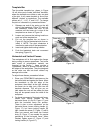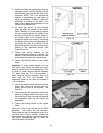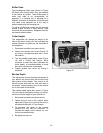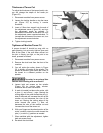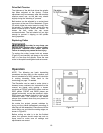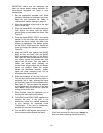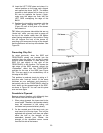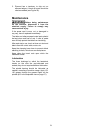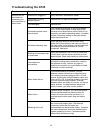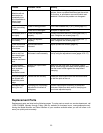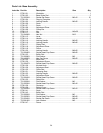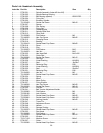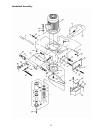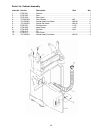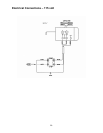
22
Troubleshooting the DT45
Trouble Probable Cause Remedy
Machine not plugged in. Verify machine is connected to power.
Fuse blown, or circuit
breaker tripped.
Replace fuse, or reset circuit breaker.
Cord damaged. Replace cord.
Overload automatic reset
has not reset.
If the Dovetailer overloads on the circuit breaker
built in to the motor starter, it takes time for the
machine to cool down before restart. Allow unit to
adquately cool before attempting restart. If problem
persists, check amp setting on the motor starter
inside the electrical box.
Dovetailer frequently trips.
Check the amp setting on the overload relay.
Match the full load amps on the motor as noted on
the motor plate. If amp setting is correct then there
is probably a loose electrical lead or a failed
component. See below.
Building circuit breaker trips
or fuse blows.
Verify that dovetailer is on a circuit of correct size.
If circuit size is correct, there is probably a loose
electrical lead. Check amp setting on motor starter.
Loose electrical
connections.
Go through all of the electrical connections on the
dovetailer including motor connections, verifying
the tightness of each. Look for any signs of
electrical arcing which is a sure indicator of loose
connection or circuit overload.
Motor starter failure.
If you have access to a voltmeter, you can
separate a starter failure from a motor failure by
first, verifying incoming voltage at 220+/-20 and
second, checking the voltage between starter and
motor at 220+/-20. If incoming voltage is incorrect,
you have a power supply problem. If voltage
between starter and motor is incorrect, you have a
starter problem. If voltage between starter and
motor is correct, you have a motor problem.
Motor failure.
If electric motor is suspect, you have two options:
Have a qualified electrician test the motor for
function or remove the motor and take it to a
qualified electric motor repair shop and have it
tested.
Machine will not
start/restart or
repeatedly trips
circuit breakers or
blows fuses.
Miswiring of the unit.
Check to make certain all electrical connections
are correct and properly tight. The electrical
connections other than the motor are
preassembled and tested at the factory. Therefore,
the motor connections should be checked as the
highest probability for error. If problems persist,
double check the factory wiring.



